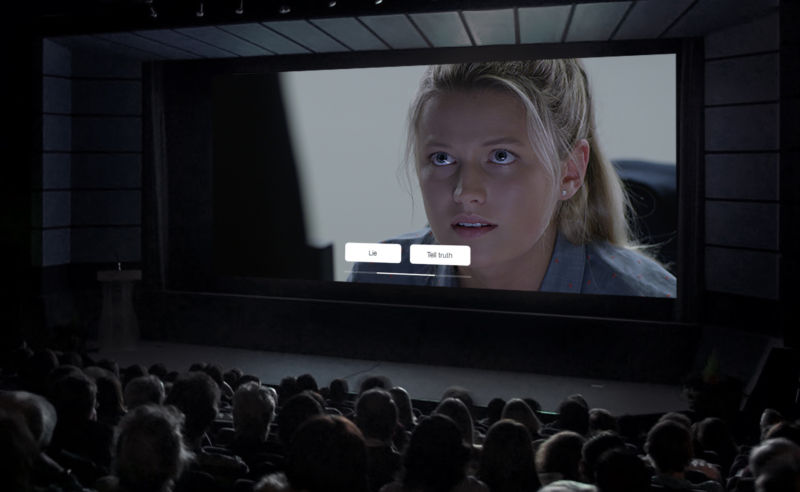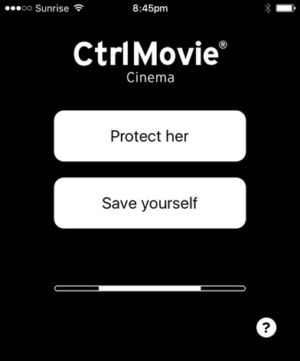
Recently I had the dubious honour of watching Late Shift, which bills itself as "the world's first cinematic interactive movie." As the movie unfolds, the cinema audience decides—using a smartphone app—how the protagonist responds to various situations, affecting how the story plays out on the big screen. There are about 180 different decision points that produce both big and small storyline branches, with seven different endings in total. The movie is being released at Vue cinemas in the UK in March 2017.
The actual running time of the movie is about 90 minutes, depending on the decisions you make, but the total amount of film, including all the endings and branches that you don't get to see, is about four hours. When I watched Late Shift, the audience's decisions led to an extremely quick and brutal ending; later, the UK distributor of the movie told me that, if we'd made another choice, the movie could've run for another 20 minutes.

You have to keep your phone in your hand and unlocked the entire time; if you try putting your phone down, you won't be able to pick it up and unlock it before the decision timer runs out. Fortunately the app is mostly black, so the glare wasn't too bad. Battery consumption was okay, too; about five percent on my iPhone 6, with power saving mode enabled.
Choose your own adventure
Being able to choose the protagonist's decisions is entirely novel, very fun, and quite thrilling. Some of the decisions are tough: do you use your words to persuade the old man to help out, or do you just hit him over the head with a golf club? Do you capitulate to the torture and give up your friend, or do you hold on to the very end? Other decisions are more mundane: do you crack open a fortune cookie in a Chinese restaurant, or do your religious and ideological beliefs forbid the dissemination of prophetic baked goods?
It is a rather odd experience, being in complete control of the protagonist. On the one hand, it's just a movie, and so you feel empowered to make crazy decisions that you'd never make in real life. When I decided to beat up the security guard, rather than sneak by, I definitely felt a heady pang of escapism. On the other hand, though, when you're the one calling the shots, you feel responsible for what happens. When I chose to coerce an older man (with a golf club!) into giving up some information, there was a fleeting feeling of complicity; an awkward, uncomfortable feeling that stuck around for a few seconds until the next decision came along.
To the film's credit, almost every decision felt like a significant branch that will affect the story in a big way—though sometimes the decision points felt laboured or telegraphed, as if the film had been constructed in such a way as to give me as many decision points as possible.
Another interesting aspect of the experience was the emergence of cinema camaraderie. For the first 10 questions or so, our decisions were distinctly cautious. As the film progressed, though, our choices became steadily more reckless, and thus so did the protagonist. Even towards the end of the film, though, as we were mowing down whoever got in our way, there was a titter of nervous laughter every time we chose the less-socially-acceptable option.
-
For some reason, the Late Shift press pack doesn't include a screenshot of the decision where you can kill the old man.
-
In one scene, this Chinese guy tortures you with some thumbscrews. Do you stick with the torture, or give up your buddy?
-
In this scene, you decide whether to let your friend vote on a priceless Chinese vase, or intervene.
-
Oh, and the film includes a BMW i8! Woo!
-
The film's poster, which is probably meant to symbolise the protagonist's various storylines.
Wisdom of crowds
There are some fundamental problems with Late Shift, though. It felt very jarring when my choice was in the minority, and thus the protagonist did the exact opposite of what I wanted. There were a few cases where I felt very strongly about one choice, such as not killing the old man, but the majority voted for the other. (Later, after the tech team had crunched some numbers, I was told that 91 percent of the audience had voted to kill the old man. I guess once you're already beating the old man up with a golf club, it's easier to get into a murderous mindset?)
Judging by the audience's reactions and some data shared with me by the film's tech team, most big decisions were passed by a sizeable majority—which leads to perhaps the main problem with the "choose your own adventure" cinema idea: the audience will generally choose the same path through the movie every time. There will be some variations from country to country and city to city, but surely each cinema, with a local catchment area and regular clientele, would pick similar decisions each time.
When I spoke to the UK distributor of Late Shift after the screening, one phrase kept popping up: "you'll just have to come and watch the movie again to find out." Clearly, that's a big part of the allure for distributors and cinemas: a repeat audience that wants to explore the film's branching storylines and different endings. The distributor even spoke about some kind of special pricing model—full price for the first viewing, but discounts if you come back. Personally, that sounds like hell—what if I end up watching almost exactly the same movie because the audience votes in the same way?
A better option, I think, would be giving you a free digital copy of the film that you can explore at your leisure (and indeed, there is already an iOS version of Late Shift that costs just £4/$5). I think it would also be nice to see the voting percentages on-screen after each decision, or perhaps to receive a breakdown of how everyone voted as you leave the cinema. The current setup is clearly quite nascent; the distributor said that they're looking into a variety of different ticketing options and tech tweaks.
How do you review a film with multiple endings?
Finally, there's one other important question: is Late Shift actually any good? If you don't have high expectations, I think you'd enjoy watching Late Shift once, though mostly for the novelty factor of deciding how the story plays out. If you expect a high-budget action film with a witty script, flashy costumes and sets, and A-list actors, you'll be disappointed.
Rather amusingly, because each viewing of the film will be slightly different, there might be versions of the film that feature better or worse dialogue, acting, emotional payoff, or even direction and editing. So, even though Late Shift wasn't my cup of tea, it might be yours. You just won't know until you've paid your £15, bough some overpriced popcorn, and sat in a dark room for 90 minutes.
One word of caution: at the end of the film, the distributor told us that we'd been watching a rough cut, and that some of the (frankly quite shoddy) editing and dubbing would be fixed before release. Apparently a car chase will be added as well—though, of course, depending on the choices you make, you might not get to watch it.
If you want to watch Late Shift, it will be be available at some Vue cinemas in the UK in March 2017. No other screenings or releases have been announced, though it looks like the film is working its way around a number of film festivals in Europe and North America.
reader comments
86